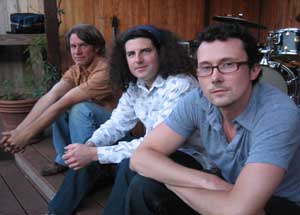Editorial
Front Page - Friday, July 31, 2009
Arts & Education Council delights movie lovers through Back Row Film series
David Laprad

These days, movie theaters use 3D audio and digital projection to lure viewers. But there was a time when the only sounds an audience would hear were those of live musicians playing along with the movie.
Jazz ensemble Kenosha Kid is a raider of that lost art. In 2001, guitarist Dan Nettles began dabbling with film during performances, and found he enjoyed turning off the theater’s lights and improvising along with a movie’s storyline. The band’s current performances are more sophisticated, involving as they do detailed outlines and multiple themes stretched to encompass an entire film.
“Adding film to music is a way to get the audience to pay close attention,” says Nettles. “And it’s been a way for me to write material I would otherwise never have realized.”
Thanks to the Arts & Education Council of Chattanooga, local film enthusiasts got a chance to experience one classic movie, Buster Keaton’s “Steamboat Bill,” the way it was meant to be seen: in black and white and with no sound except Kenosha Kid doing its thing.
At 73 minutes long, the 1928 black and white film stars Keaton as Junior, an educated young man whose cantankerous father forces him to learn the ropes of river boating. Set on the Mississippi River, the movie is loaded with intricate sight gags, acrobatic feats and cinematic ingenuity, all leading up to a climactic storm sequence, making it the perfect backdrop for a live jazz concert.
“Buster Keaton was the perfect victim for me,” says Nettles. “There he was, trapped onscreen, being blown about by the wind, dropped off buildings, spun around in circles, chased by dogs, all with his great stone face. And now he has a band following his every move.”
With Nettles on guitar, Neal Fountain on bass and Marlon Patton on drums, Kenosha Kid offers a fermented blend of New York City jazz soaked in the college rock town of Athens, Ga. Their focus is always on instrumentation, song arrangement and band sound over soloing, making it the perfect match for a Keaton film.
“Silent films began as modern masterpieces, became outdated when sound was added to picture, became classics once film had enough history behind it, and recently achieved some sort of postmodern notoriety,” says Nettles. “The world we see in a silent film is like a sci-fi planet. How can we relate to the barbershops, old cars, clothing, dialog cards and ultra-expressive Kabuki theater type acting?
“The passage of time is what makes my music a good fit for silent films. Years after it was made, it reaches my modern eye. The music I wrote for it has everything to do with my reactions as a viewer in 2009.”
Nettles says composing the score for “Steamboat Billy” wasn’t easy. “Anger, introspection, spookiness and sadness are much easier to portray,” he says. “It was hard to sit down and write something that’s funny and still gratifying to perform night after night. It was revealing to be a serious musician in a serious art form and realize comedy required musical muscles I rarely use.”
The trio has performed in New York, Montreal, Vancouver, the states of Montana, Washington and Oregon, repeatedly throughout the southeastern U.S. and in Germany. Their performances are often multimedia events featuring silent films and original scores performed
simultaneously.
Nettles says the response to their performances is almost universally positive.
“The hurdle is usually getting people to understand what the event is, but once they get to the show, they love it,” he says. “Fortunately, ‘Steamboat Bill’ is a great film, so if you don’t like the music, you’re still entertained, and visa versa.”
Kenosha Kid’s performance of their original score for “Steamboat Bill” was an event in the AEC’s Back Row Film Series.
The series features film screenings paired with guest speakers, musical performances, culinary presentations and visual art. Program topics, says AEC on www.backrowfilms.com, “address issues that are relevant to our community and draw a diverse and engaged audience.” The result is an innovative approach to film viewing that connects each art form and encourages conversations.
“The most gratifying comments are when people come up to me after a show and say things like, ‘I couldn’t pay attention to the movie because the band was so good’ or ‘I’ve never had an experience where a band takes me away like that,’” Nettles says.
Created in 2005 in response to the Chattanooga community’s demand for more film programming, the series is held from May through September at various venues in the community.
The AEC is a non-profit organization founded in 1952 as one of 12 pilot agencies founded by a Ford Foundation grant. Programs include the Conference on Southern Literature and its school literacy outreach, the Chattanooga Festival of Writers, Culture Fest, TheatreExpress, the Back Row and Independent Film Series, and current affairs television programs “Point of View” and “First View.”
Kenosha Kid’s performance of their original score for “Steamboat Bill” took place Saturday, July 25 at 7 p.m. at the Barking Legs Theater, located at 1307 Dodds Avenue.
“The most magical moment is when the lights go down, a hush fills the room and the film rolls — and the audience realizes this is like no other music or film experience they’ve ever had,” says Nettles. “A spell is cast and it feels like we’re all participating in the event together.”
|
|